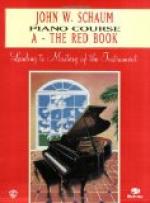“I can say I prefer playing in America to anywhere else in the world; for there are more real appreciation and understanding here than in any other country. Of course the great music centers all over the world are about the same; but the difference lies in the smaller cities, which in America are far more advanced musically than in Europe. I have proved this to be the case repeatedly. Not long ago I was booked for a couple of recitals in a small town of not more than two thousand inhabitants. When I arrived at the little place, and saw the barn of a hotel, I wondered what these people could want with piano recitals. But when I came to the college where I was to play and found such a large, intelligent audience gathered, some of whom had traveled many miles to be present, it proved in what estimation music was held. The teacher of this school was a good musician, who had studied nine years with Leschetizky, in Vienna; the pupils understood the numbers on the program, were wide awake, and well informed as to what was going on in the world of music.
“One handicap the present day pianist encounters, who plays much with orchestra, and that is the dearth of modern concertos. The familiar ten or dozen famous ones are played over and over, and one seldom hears anything new. There are new ones written, to be sure, but the public has not learned to care for them. The beautiful second concerto of Rachmaninoff has not made a success, even in the great music centers, where the most intelligent audiences have heard it. I believe that if an audience of the best musicians could be assembled in a small room and this work could be played to them, they could not fail to be impressed with its beauties. I am now studying a new concerto by Haddon Wood, which you see in manuscript there on the piano; it is one I find very beautiful.”
A subsequent conversation with the artist elicited the following:
“I might say that I began my music when about four years old, by playing the Russian National Hymn, on a toy piano containing eight keys, which had been given me. My older sister, who was studying the piano, noticed this, showed me a few things about the notes, and I constantly picked out little tunes and pieces on the real piano. Finally one day my sister’s teacher, Rudolph Heim, came to the house, mainly on my account. This was in Odessa, in the south of Russia, where I was born and where I spent my early years. On this occasion, he wanted to look at me and see what I could do. Unluckily a sudden fit of shyness overcame me and I began to cry; the exhibition could not take place, as nothing could be made out of me that day. You see I was headstrong even at that early age,” said the young pianist, with one of her charming smiles.




